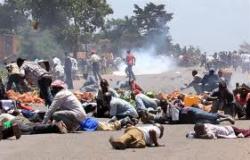Uganda is heading for conflict – ICG warns
By John Stephen Katende
9th April 2012:
A reputable international crisis tracking and analysis organisation has predicted that Uganda may be heading for a period of conflict and political instability. “…Unless President Yoweri Museveni breaks with the ways of his predecessors and the trend of his own lengthy rule, popular protests and discontent will grow in Uganda.” the International Crisis Group [ICG] warned.
In its Africa Report No 187 released simultaneously in Nairobi and Brussels on April 5, the ICG also warned that “…unless President Museveni changes course…events may eventually spiral out of his control…and considering Uganda’s violent past, conflict might then become more deadly.”
The ICG also said although most Ugandans are better off than they were a quarter-century ago, frequent demonstrations and violent crackdowns indicate that many are now deeply dissatisfied with Museveni’s continued rule. This, the ICG says, “…is largely the consequence of a slow shift from a broad-based constitutional government to patronage-based, personal rule.”
The ICG also said President Museveni is essentially following in the footsteps of his predecessors like Idi Amin and Milton Obote. Like them, the ICG says, Museveni “…has failed to overcome regional and religious cleavages that make Uganda difficult to govern and has relied increasingly on centralisation, patronage and coercion to maintain control.”
The global crisis tracking group also pointed out that Uganda’s democratic initiatives lost momentum after the first decade of President Museveni’s rule. “…Instead of supporting the no-party system as the framework for unfettered participation, the president began using it to further his own objectives.” ICG said.
According to the ICG, it is Museveni’s focus on his own objectives that forced him to get rid of politicians and longstanding NRM members who criticised his policies. He then replaced them with trusted members of his inner circle who the ICG says, were “often from his home area…and thus created a patronage network loyal to him.”
As if to lend weight to its nepotism and patronage charge against President Museveni, the ICG pointed to the rise of Forum for Democratic Change [FDC] Dr Kizza Besigye who, it says, “…burst into national politics in 1999 when he publicly criticised the government for losing interest in democracy while tolerating corruption among top officials.”
The ICG also accused Museveni of using the “opening political space” in 2005 as a cover under which to reduce the powers of parliament, the judiciary and watchdog agencies – as well as dropping the two-term presidential limit – a move that allowed him to retain power and consolidate his party’s strength across the country.
Commenting on the 2011 elections, the ICG said although it was less violent, Museveni “…injected huge amounts of official funds into his campaign, and the government and NRM harassed the opposition.”
Because of this, the ICG then raised doubt over the credibility of Museveni’s election victory, saying it is now “…uncertain whether this [Museveni’s victory] reflected more his popularity or the power of his purse and other resources.”
The ICG also warned that the discovery of significant oil reserves is unlikely to reduce social and political tensions. On the contrary, ICG says the oil wealth will enable Museveni to “…consolidate his system of patronage…increase corruption, and disrupt the steady growth produced by economic diversification.”
According to the ICG, the October 2011 parliamentary revolt over the lack of transparency in oil contracts and alleged payments to ministers also suggests the president’s control is now far from absolute. “…Increasingly, Museveni fails to anticipate opposition, some of it from NRM politicians and his inner circle.”
Most government spokesmen have in the past, however, poured scorn on such warnings from international organisations like the ICG, arguing that they are out of touch with the political realities in Uganda. END. Please login to www.ugandacorrespondent.com every Monday to read our top stories and anytime mid-week for our news updates.
![]()


